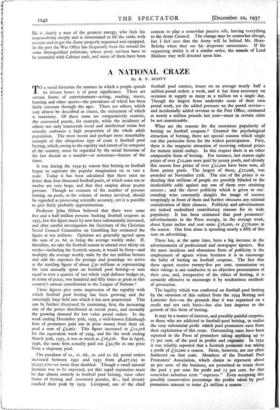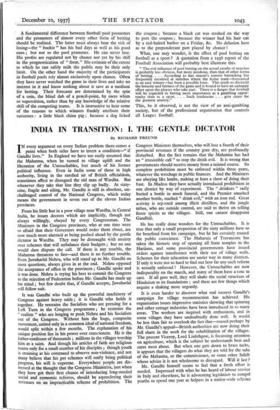A NATIONAL CRAZE
By R. F. SCOTT TO a social historian the manner in which a people spends its leisure hours is of great significance. There are certain forms of entertainment—acting, reading, music, hunting and other sports—the prevalence of which has been fairly constant through the ages. There are others, which niay almost be described as crazes, the enjoyment of which is transitory. Of these some are comparatively esoteric, the crossword puzzle, for example, while the incidence of others not only transcends social and intellectual strata but actually embraces a high proportion of the whole adult population. The most recent and perhaps most remarkable example of this ubiquitous type of craze is football pool betting, which, owing to the rapidity and extent of its conquest of the country, must be regarded by the social historian of the last decade as a notable—or notorious—feature of the times.
It was during the 1934-35 season that betting on football began to captivate the popular imagination on so vast a scale. Today it has been calculated that there exist no fewer than four thousand football pools, of which some ten or twelve are very large, and that they employ about 30,000 persons. Though no estimate of the number of persons betting on pools, or the volume of money involved, should be regarded as possessing scientific accuracy, yet it is possible to give fairly probable approximations.
Professor John Hilton believed that there were some five and a half million persons backing football coupons in 1935, but this figure must by now have substantially increased, and after careful investigation the Secretary of the Christian Social Council Committee on Gambling has estimated the figure at ten millions. Opinions are generally agreed upon the sum of 2s. 6d. as being the average weekly stake. If, therefore, we take the football season to extend over thirty-six weeks—including the Scottish season, it would be forty—and multiply the average weekly stake by the ten million bettors and add the expenses for postage and poundage we arrive at the startling figure of about £50 millions as representing the sum annually spent on football pool betting—a sum equal to over a quarter of our whole 1936 defence budget or, in terms of peace, two hundred and fifty times as great as this country's annual contribution to the League of Nations !
These figures give some impression of the rapidity with which football pool betting has been growing and the amazingly large field into which it has now penetrated. This can be further illustrated by examining, first, the increasing size of the prizes distributed in recent years, and secondly the growing demand for low value postal orders. In the week ending December 30th, 1933, a well-known Edinburgh firm of promoters paid out in prize money from their 2d. pool a sum of £2,962. This figure increased to £11,.2z8 for the equivalent week of 1934, and for the week ending March 3oth, 1935, it was as much as £16,216. But in April, 1936, the same firm actually paid out £30,780 in one prize from a sixpenny pool.
The purchase of is., is. 6d., 2s. and 2s. 6d. postal orders increased between 1931 and 1935 from 48,427,195 to 97,257,170—or more than doubled. Though a small natural increase was to be expected, yet this rapid expansion must be due almost entirely to football pool betting, since other forms of betting and _Tossword puzzles, &c., had already reached their peak by 1929. Liverpool, one of the chief football pool centres, issues on an average nearly half a million postal orders a week, and it has been necessary on occasion to supply as many as a million on a single day. Though the largest firms undertake some of their own postal work, yet the added pressure on the postal service— and incidentally added revenue to the Post Office, estimated at nearly a million pounds last year—must in certain cities be not unnoticeable.
What are the reasons for the enormous popularity of betting on football coupons ? Granted the psychological attraction of betting, there are special reasons which single out this particular form for the widest participation. First, there is the magnetic attraction of receiving colossal prizes for minute initial outlays. In this respect there is no other comparable form of betting. For instance, last season eight prizes of over £12,000 were paid by penny pools, and already this season four prizes of over L22,000 have been won, all from penny pools. The largest of these, £27,096, was awarded on November 27th. The size of the prizes is so dazzling that millions of people are possibly blinded to the incalculable odds against any one of them ever attaining success ; and the clever publicity which is given to out- standing wins constantly dangles the image of success temptingly in front of them and further obscures any rational consideration of their chances. Publicity and advertisement are indeed undoubted contributory reasons for its wide popularity. It has been estimated that pool promoters' advertisements in the Press occupy, in the average week, about 8,000 inches and cost some £16,000, or £576,000 in the season. One firm alone is spending nearly a fifth of this sum on advertising.
There has, at the same time, been a big increase in the advertisements of professional and newspaper tipsters. But the most insidious and obnoxious form of publicity is the employment of agents whose business it is to encourage the habit of betting on football coupons. The fact that these agents receive twenty-five per cent, commission on their takings is not conducive to an objective presentation of their case, and, irrespective of the ethics of betting, it is certainly offensive to encourage it by tendentious methods of persuasion.
The legality which was conferred on football pool betting by the omission of this subject from the 1934 Betting and Lotteries Act—on the grounds that it was organised on a credit and not cash basis—has also lent impetus to the growth of this form of betting.
It may be a matter of interest, and possibly painful surprise, to those who are addicted to football-pool betting, to realise the very substantial profit which pool promoters earn from their exploitation of this craze. Outstanding cases have been reported in the Press of promoters taking anything up to 77 per cent. of the pool in profits and expenses. In 1934 it was reliably reported that a Scottish promoter was taking a profit of L5o,000 a season. Nests, however, are not often feathered on that scale. Members of the Football Pool Promoters' Association, which claims to represent about 90 per cent. of the business, are permitted to retain from the pool 5 per cent. for profit and 15 per cent. for that somewhat nebulous term "expenses." Even accepting this possibly conservative percentage the profits taken by pool promoters amount to some £2 million a season.. A fundamental difference between football pool promoters and the promoters of almost every other form of betting should be realised. The latter must always bear the risk of losing—the " bookie " has his bad days as well as his good ones ; but not so the pool promoter. He can never lose. His profits are regulated not by chance nor yet by his skill in the prognostication of "form." His estimate of the extent to which he can safely milk the public may be their only limit. On the other hand the majority of the participators in football pools rely almost exclusively upon chance. Often they have never watched the game in their lives and take no interest in it and know nothing about it save as a medium for betting. Their forecasts are determined by the spin of a coin, the blind dab of a pencil-point, by mere whim or superstition, rather than by any knowledge of the relative skill of the competing teams. It is instructive to hear some of the reasons to which winners frankly attribute their successes : a little black china pig ; because a dog licked the coupon ; because a black cat was stroked on the way to post the coupon ; because the winner had his hair cut by a red-haired barber on a Friday, &c. No delusion here as to the preponderant part played by chance !
What, one may wonder, is the effect of pool betting on football as a sport ? A quotation from a 1936 report of the Football Association will probably best illustrate this.
"The evil influence of pool betting on the actual results of matches is probably less obvious, but more insidious, than that of other forms of betting. . . . According to this season's reports barracking has frequently occurred at matches where the home team—forecasted as an easy winner—has been a possible loser. This tends to discredit the honesty and fairness of the game and is bound to have an unhappy effect upon the players who take part. There is a danger that football will be regarded as having more importance as a gambling oppor- tunity than as a sport. . . . Such tendencies . . . give cause for the greatest anxiety."
This, be it observed, is not the view of an anti-gambling society, but of the professional organisation that controls all League football.























































 Previous page
Previous page